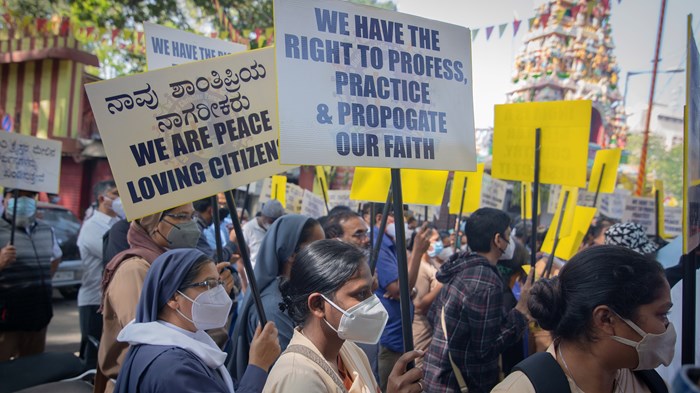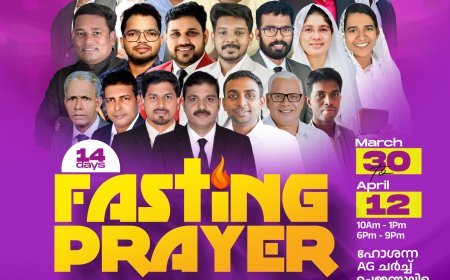India’s Anticonversion Laws Loophole
The government didn’t have the votes to pass a controversial bill in Karnataka. So it found another way.

Last month, a delegation of Christian leaders met with Thawar Chand Gehlot, the governor of the southwest Indian state of Karnataka. Their aim: to discourage Gehlot from signing an anticonversion ordinance that they believe will embolden religious radicals to stir unrest.
Despite what Bengaluru archbishop Peter Machado described as a “courteous and welcoming” reception, Gehlot signed the ordinance the following day, May 17, making Karnataka the 13th out of India’s 29 states to pass legislation of this kind.
The ordinance prohibits numerous behaviors including conversion by “force, undue influence, coercion, allurement or by any fraudulent means or by marriage,” and forbids anyone from helping or conspiring on conversions. It allows people beyond the convert—including family members, relatives, or even colleagues—to file complaints.
The ordinance also stipulates a jail term ranging from three to five years and a fine of 25,000 rupees (roughly $320). If the convert is a woman, child, or Dalit, the punishment can increase to up to 10 years in prison.
India’s first anticonversion law passed in the state of Madhya Pradesh in 1967. In recent years, as the Hindu nationalist Bhartiya Janta Party (BJP) has gained power across India, the party has begun to frequently promise these laws on the campaign trail.
But passing this legislation proved challenging in Karnataka, a state known widely by Westerners as the home of Bengaluru (Bangalore), a tech hub for many multinationals. Afraid that the majority party lacked the votes to pass an anticonversion bill, the governor directly promulgated it as an ordinance, or temporary law, that can remain in effect until it is replaced by a law.
“The government attempted to get this bill passed despite strong opposition from the Christian community and the united opposition parties who opposed the bill on the house floor,” said Atul Y. Aghamkar, who leads the National Centre for Urban Transformation at the Evangelical Fellowship of India (EFI). “However, they could not get it through the legislative council because they did not enjoy the majority there.
“So, this bill was processed and passed through a back door ordinance when the assembly and council were not in session,” he told. “That itself shows the government’s intent, as they could not face the discussion on the bill in both houses.”
Anti-Conversion Laws in India
Last month, Karnataka (red) became the 13th of 29 states to restrict conversion. Nine states have active laws (orange) with one pending, and three have inactive ones (gray).

“A crime tomorrow”
Karnataka Christians have two primary fears. The first is that the described actions banned from accompanying conversions are overly broad and will lead to a crackdown on actions unrelated to conversion.
“It will be a crime tomorrow to do some charity,” said Machado last month:
So, giving free education will also be a big problem. If I have to help a Dalit child, who can’t afford to pay the fees, I’ll have to fill a number of forms. I will have to explain why the child is being helped, and why I am offering free education.
If we are going to explain why we are distributing gifts, tomorrow Santa Claus will be a dangerous character too.
Those who break the law face up to 10 years in prison—the same penalty as convicted rapists. Such a punishment strikes Christian activist John Dayal as egregiously cruel.
“What message are they trying to convey by bringing such a law?” he said.
Second, church leaders say gangs and mobs will use these laws as justification for anti-Christian violence.
“This ordinance is just a simple act on the part of this government to allow the vigilante groups to have the freedom to attack Christians, destroy Christian institutions, and create an atmosphere of fear to subjugate the Christian community,” Aghamkar said. “Karnataka has seen many reported and unreported cases of attacks on Christians in the recent past, and these are bound to increase in the wake of the introduction of this ordinance.”
Christians comprise less than 2 percent of Karnataka’s population of 64 million. Muslims, whom the bill also targets through its prohibition on “unauthorized” interfaith marriages, comprise 13 percent. Hindus comprise 84 percent.
What's Your Reaction?
 Like
0
Like
0
 Dislike
0
Dislike
0
 Love
0
Love
0
 Funny
0
Funny
0
 Angry
0
Angry
0
 Sad
0
Sad
0
 Wow
0
Wow
0





